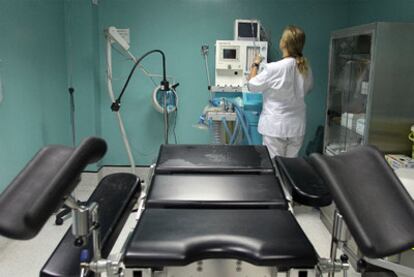Abortions: fewer and earlier
One year after reform came into effect, alarmist predictions fail to materialize
A year after Spain's new sexual and reproductive health law went into effect, statistics show a continued decline in abortions across nearly all the regions. Women are also terminating their pregnancies earlier than under the previous legislation.
The law, which allows abortions on request for the first 14 weeks of gestation, mirroring other European countries such as the Netherlands or France, was hotly contested by the conservative Popular Party (PP) on grounds that abortion rates would skyrocket. Previously, the procedure was only allowed in cases of rape, fetus malformation of risk to the woman's physical or mental health, and required a doctor's report. In practice, the mental health clause was invoked in the vast majority of cases.
The Constitutional Court is still due to rule on an appeal against the law filed by the PP. In the meantime, pregnancy terminations - which had already declined 3.7 percent in 2009 - continued their downward trend in 2010, according to private clinics, which perform over 90 percent of abortions. But there are differences among the regions.
"In Andalusia, for instance, [abortions] fell between three to five percent, depending on the province," says Francisca García, spokeswoman for Acai, an association of around 30 licensed abortion clinics.
The Health Ministry still does not have its 2010 report ready, but several regional governments confirmed the decline, or else reported similar figures as other years. In the Valencian region, for example, there were around 300 fewer abortions than in 2009. In Murcia, one of the regions with the highest abortion rates, there was a one-percent increase last year following a 10-percent drop between 2008 and 2009.
José Martínez Olmos, secretary general for health affairs, would not give out percentages but did say that the downward trend remained in place with the new law, contrary to what the PP had predicted. "The sale of the 'morning-after pill' without prescription, pregnancy prevention programs and the advent of new subsidized contraceptives are all helping reduce the number of unwanted pregnancies," he said.
But García, of the abortion clinic association, has another explanation: the decline in immigration to Spain. In recent years, she said, abortions by foreign women represented 40 percent of all abortions in Spain.
Luisa Torres, a social worker at Clínica Dator in Madrid, says that women are now deciding to have an abortion earlier than ever. "They had never come as early as this. Some come as soon as they've had a delay in their period," she explains. Most abortions have always been carried out before week 12, but now it's earlier than ever, Torres says.
Marta G., 36, is five weeks pregnant and has come to a private abortion clinic in Madrid with a girlfriend. "I realized I cannot have a child with my partner. It would be a big mistake. So why postpone the decision?"
The most controversial part of the law allows 16- and 17-year-old girls to have an abortion without parental consent (and even without their knowledge if she alleges a serious family conflict). Underage women who show up at abortion clinics by themselves make up 10 to 20 percent of cases, said García, although Torres raised that figure to 40 percent.
Laura, who is 16, is six weeks pregnant. She just finished her fourth year of high school, and wants to go to college some day. "I can't have a baby now," she says. Her parents would not support her if they knew, she adds. Her sister became pregnant two years ago, and told her parents about it. "She had the child, but they didn't help her out."

Tu suscripción se está usando en otro dispositivo
¿Quieres añadir otro usuario a tu suscripción?
Si continúas leyendo en este dispositivo, no se podrá leer en el otro.
FlechaTu suscripción se está usando en otro dispositivo y solo puedes acceder a EL PAÍS desde un dispositivo a la vez.
Si quieres compartir tu cuenta, cambia tu suscripción a la modalidad Premium, así podrás añadir otro usuario. Cada uno accederá con su propia cuenta de email, lo que os permitirá personalizar vuestra experiencia en EL PAÍS.
¿Tienes una suscripción de empresa? Accede aquí para contratar más cuentas.
En el caso de no saber quién está usando tu cuenta, te recomendamos cambiar tu contraseña aquí.
Si decides continuar compartiendo tu cuenta, este mensaje se mostrará en tu dispositivo y en el de la otra persona que está usando tu cuenta de forma indefinida, afectando a tu experiencia de lectura. Puedes consultar aquí los términos y condiciones de la suscripción digital.








































